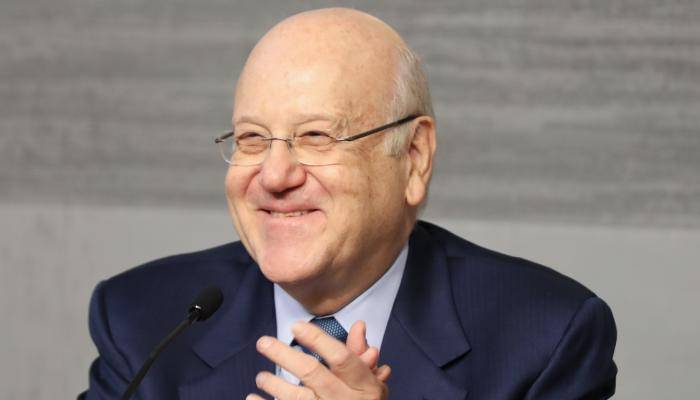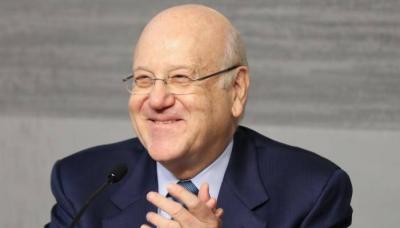More than a week ago, former minister and head of the "Arab Unification" party, Wiam Wahhab, revealed that "the designated Prime Minister Najib Mikati requested an appointment with President Michel Aoun, but the latter refused." He indicated that "Tourism Minister Walid Nassar delivered a message from Aoun to Mikati stating, 'If you don't have anything new, don't come to me.'" Wahhab's scoop, which he presented live on-air, attracted attention, dialogue, analysis, and scrutiny before the unfolding events confirmed its accuracy.
On the morning of June 29, over twenty days ago, the designated Prime Minister arrived at the Baabda Palace following the non-binding parliamentary consultations he conducted with parliamentary blocs. On that day, Mikati presented his first governmental draft, written in his own handwriting, which quickly made its way to the media, igniting disputes between Aoun's team and Mikati's team.
After a period of calm returned to the Baabda-Saray front, a second meeting was recorded between the President and the designated Prime Minister, during which Aoun presented a package of ideas, proposals, and suggestions concerning the first draft, primarily aimed at enriching the government with political figures and making the Ministry of Interior subject to rotation, which this time would be allotted to the "Free Patriotic Movement."
Barely a few hours passed before Mikati's office rushed to respond by directly targeting the "movement" and pointing out that "the 'Free Patriotic Movement' holding the Energy Ministry for 17 years without providing a solution is the actual charge sheet, and removing the 'movement' from the ministry is the gateway to solving the sector’s crisis and real reform in this file." Wahhab's scoop was seen as the last straw, especially since Mikati viewed it as a breach of protocol after the palace ignored his request for an appointment to consult with the President.
Mikati returned to the Saray as the caretaker Prime Minister, ignoring the issue of cabinet formation as if it were nonexistent. Thus, stagnation on the formation line solidified, while indicators suggested that this state could persist as long as the concerned parties, particularly Aoun's team and Mikati's team, were unwilling to take a step forward amid mutual accusations of obstruction and procrastination, as if a caretaker government were most appropriate.
Aoun's team criticizes the designated Prime Minister for not being enthusiastic about accelerating the issuance of formation decrees after he pocketed the assignment, especially since Aoun's term is nearing its end, meaning he is not compelled to accommodate Mikati's demands. Consequently, maintaining the current government, despite its constitutional flaws, remains the lesser of two evils. Meanwhile, Mikati criticizes Aoun’s team for not being eager for formation since their share in the new government would shrink; thus, it is better for them to hold on to their "deposits," particularly in the Energy Ministry. For this reason, both teams, despite their disagreement, converge on the choice of maintaining the caretaker government, at least until the final days of President Aoun's term. At that point, only the presidential electoral deadline's variables might impose new pathways.
In the meantime, will there be an effort to revive or activate the caretaker government? So far, Mikati is content with the established norms for running the affairs and shows no signs suggesting he is about to expand the framework, noting he does not mind at all, should circumstances require, to broaden the notion of running affairs by convening a Cabinet session, which he had previously done in 2011, especially since he does not face this time the "obstacle" of the bidding that may be practiced by the members of his sect. However, at this moment, he sees no justification to take this step and is content with the ministerial meetings he holds at the Saray regarding vital and daily issues.
In this context, Mikati does not hesitate to send messages to those concerned that he is ready to hold a Cabinet session to dismiss the Governor of the Central Bank of Lebanon, Riad Salameh, but on the condition of a prior agreement on a replacement. With this, he aims to respond to accusations directed at him concerning providing protection and cover for the Central Bank's governor by establishing mandatory understanding prior to the session, knowing that this condition is currently unavailable.
Thus, it is understood that Mikati decided to focus on running affairs, especially after he encountered a protocol problem, as he was denied an appointment at the palace... which means that the designated Prime Minister will not visit Baabda unless there is a "protocol correction" that restores order, especially since what reaches his ears from the negative atmosphere surrounding Baabda Palace only adds more fuel to the fire, prompting him to resort to the song "Ala Al-Asforya"!




